According to previous reporting, FQHCs are health centers able to receive federal grant funds. TOMAGWA operates as a safety net clinic, relying on private donations to fund its health care services for uninsured and underinsured residents in Tomball, Magnolia and Waller.
“This is an incredible milestone in TOMAGWA’s history and for its mission of expanding access to primary care for those most in need while achieving financial sustainability,” TOMAGWA CEO Timika Simmons said in an email. “We began this journey nearly three years ago during the global pandemic and have faced many challenges along the way.”
Simmons said she expects the Health Resources and Services Administration, the arm of the U.S. Department of Health and Human Services that governs the FQHC program, to conduct site visits at the Tomball and Magnolia clinics in late August or early September after accepting TOMAGWA’s application in late June.
To apply for the FQHC Look A Like designation—which meets the requirements of an FQHC but has not yet received federal funding—TOMAGWA has had to scale up its operations over the last three years, including adding staff and expanding care for women and children, among other service lines. Simmons said TOMAGWA hired an OB-GYN to expand its services.
“We are working with her now to fully design out the infrastructure for our program, and then we’ll start to market the OB services,” Simmons said in an interview.
Previously, TOMAGWA’s services for women focused on cancer screenings, she said.
With more robust services and the ability to care for patients with Medicaid as part of the FQHC process as well—instead of only the uninsured—Simmons said TOMAGWA’s patients can remain with the clinic for longer instead of being referred out to a pediatrician or OB-GYN.
“Before, we [would] help the children get on the Medicaid programs and then refer them away,” Simmons said in an interview. “It’s just beautiful and in alignment with our mission to be able to utilize that FQHC designation to provide that care for our children and our women who have been our patient, and they can have the ... same compassionate services they’re used to. So [the service lines] open a large door for members of our community that was not there before.”
Growing demand
As TOMAGWA awaits its designation to allow the clinic more financial sustainability, the number of uninsured residents in Tomball and Magnolia is growing.
TOMAGWA’s 2023 community health needs assessment reported 14% of patients in TOMAGWA’s service area, or 29,111 individuals, did not have health insurance. The majority of TOMAGWA’s patients reside in seven ZIP codes and are most concentrated in Magnolia and Tomball ZIP codes, according to the assessment.
Locally, the number of uninsured residents grew the most from 2016-21 in Magnolia ZIP code 77355—rising 35.96% to 4,896 residents—and Pinehurst ZIP code 77362—jumping 166.97% to 1,778 residents, according to five-year American Community Survey estimates from the U.S. Census Bureau. That means 28% of Pinehurst residents did not have health insurance in 2021, the highest concentration within TOMAGWA’s service area.“We are having trouble staffing up at the rate of demand,” Simmons said in an email. “In 2023 we are projected to exceed prepandemic visit numbers, and in 2024 we are projected to see exponentially more than we have in our history.”
Simmons said as of late May, there were 140 people on the waiting list for dental services and 1,043 on the waiting list for medical services. She said there’s more demand from patients than TOMAGWA can handle at its funding capacity, and as the organization had to scale its operations to apply for the FQHC designation—which is costly—TOMAGWA’s greatest need is financial support to sustain its operations at this level until it receives the federal designation.
However, she said achieving the designation will be rewarding for the community.
“TOMAGWA isn’t just transitioning to becoming a Federally Qualified Health Center; TOMAGWA is transitioning to becoming a culture of ‘Yes,’” Simmons said in an email. “Women, children, mental health, medications and wrap-around services, to name a few, will be available in abundance.”





